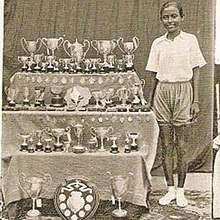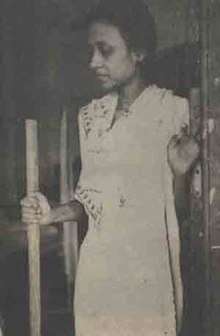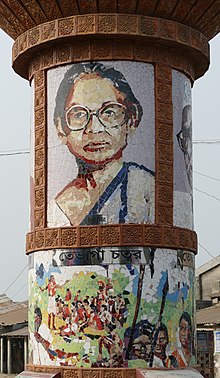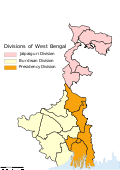Ila Mitra
Ila Mitra (née Sen; 18 October 1925 – 13 October 2002) was a communist and peasants movement organizer of the Indian subcontinent, especially in East Bengal (now Bangladesh).
Ila Mitra | |
|---|---|
ইলা মিত্র | |
.jpg) Mitra in 1955 | |
| Member of the West Bengal Legislative Assembly for Maniktala | |
| In office 1962 – 1971,1972-1977 | |
| Preceded by | Ranendra Nath Sen,Anila Debi |
| Succeeded by | Anila Debi,Suhrid Mallick Chowdhury |
| Constituency | Maniktala |
| Personal details | |
| Born | Ila Sen 18 October 1925 Kolkata, Bengal Presidency, British India |
| Died | 13 October 2002 (aged 76) Kolkata, India |
| Political party | Communist Party of India |
| Spouse(s) | Ramendra Mitra |
Early life and education

Mitra's ancestors were from Bagutia village in the present-day Jhenaidah District.[1][2] She was born on 18 October 1925 in Kolkata.[3] She completed her IA and BA examinations from Bethune College in Calcutta in 1942 and 1944 respectively.[3]
Ila Mitra First 2 Student
- Late. Mst.Rahima Begam
- Mst.Hira Begam
Leading role in peasant uprising
Mitra was the leader of peasants and indigenous Santhals in greater Rajshahi region, currently in the district of Chapai Nawabganj, and was often referred to by them as RaniMa (Queen mother). She organized a peasant-santhal uprising in Nachole Upazila, Chapai Nawabganj on 5 January 1950, but the uprising was thwarted by the police and Ansar Bahini. Mitra was arrested by the police while trying to escape. She was detained at the Nachole police station for four days, and during the detention, she was repeatedly gang-raped and tortured by the policemen.[4] Then she was sent to the Rajshahi Central jail on 21 January 1950, where she was reportedly tortured for not accepting her involvement in the rebellion. After a trial for treason, Mitra was sentenced to life imprisonment.
Later life

Partly due to the torture, Mitra fell very sick in jail. In 1954, the United Front government of Pakistan paroled her and sent her to Kolkata for treatment. As she was a Hindu and a Communist activist, to avoid persecution, she did not return to Pakistan and stayed the rest of her life in India. She also participated in mobilizing public opinion and support during the Bangladesh Liberation War of 1971.
She was elected to the West Bengal Legislative Assembly for Maniktala constituency during 1962 - 1971 and 1972 - 1977.
She played part in stopping riot against Muslims in West Bengal in 1965.[5]

Mitra died in Kolkata on 13 October 2002.[1]
Awards
- Soviet Land Neheru for literary translation work
- Tamra Patra from the government of India.
References
- "Ila Mitra - Revolutionary, Trailblazer". The Daily Star. 17 October 2015. Retrieved 12 November 2017.
- "Ancestral home of Ila Mitra lies uncared for". Dhaka Tribune. 23 October 2016. Retrieved 1 August 2020.
- Mesba Kamal (2012). "Mitra, Ila". In Sirajul Islam and Ahmed A. Jamal (ed.). Banglapedia: National Encyclopedia of Bangladesh (Second ed.). Asiatic Society of Bangladesh.
- Panjabi, Kavita (14 August 2010). "Otiter Jed or Times of Revolution: Ila Mitra, the Santals and Tebhaga Movement". Economic & Political Weekly. Mumbai: Sameeksha Trust. XLV (33). ISSN 2349-8846. Retrieved 15 May 2016.
- Mar 2, Dipawali Mitra | TNN | Updated:; 2020; Ist, 15:23. "Peace message: Citizens recount shared riot history on Facebook | Kolkata News - Times of India". The Times of India. Retrieved 1 August 2020.CS1 maint: extra punctuation (link) CS1 maint: numeric names: authors list (link)
Further reading
- Ajoy Roy (18 October 2002), "Comrade Ila Mitra: A tribute [Part I]", Mukto-Mona, archived from the original on 10 September 2005, retrieved 12 April 2015
- Ajoy Roy (18 October 2002), "Comrade Ila Mitra: A tribute [Part II]", Mukto-Mona, archived from the original on 3 September 2005, retrieved 12 April 2015
- Ajoy Roy (18 October 2002), "Comrade Ila Mitra: A tribute [Part III]", Mukto-Mona, archived from the original on 3 September 2005, retrieved 12 April 2015
